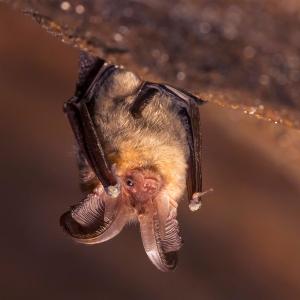Bats in disrupted ecosystems are more frequently infected with coronaviruses
31 Mar 2023
Bats in human-dominated ecosystems have a higher prevalence of coronaviruses, increasing the possibility that these could be transmitted to humans.
31 Mar 2023
Bats in human-dominated ecosystems have a higher prevalence of coronaviruses, increasing the possibility that these could be transmitted to humans.

Close-up of a long-eared bat (Plecotus auritus) | © Martin / stock.adobe.com
Over the past 20 years, coronaviruses in wild bat populations have led to three major disease outbreaks in humans: SARS in 2002, MERS in 2012 and COVID-19. The latter triggered an ongoing global pandemic. In turn, this has focused greater attention on zoonotic diseases, infectious diseases that are transmitted from animals to humans.
One thing has become clear: human land use change is a major driver of pathogen transmission from wildlife to humans – so called zoonotic spillover events. In part, this is a result of changes in the abundance and distribution of wild zoonotic hosts and of bringing wildlife into closer contact with humans.
Now a study led by Dr. Vera Warmuth from LMU’s Department of Evolutionary Genetics reveals another important factor: the study clearly demonstrates that bats in human-dominated habitats are more frequently infected with coronaviruses than bats in less disturbed habitats.
1:19 | 3 Apr 2023
Our findings clearly show that animals in disrupted ecosystems are more frequently infected. The more heavily an area is influenced by humans, the higher the probability of bats living in this area being infected with coronaviruses.Vera Warmuth

Human intrusions into nature, such as deforestation for agriculture, are ecological stressors that affect infection rates of bats. | © Richard Carey / stock.adobe.com
To arrive at this conclusion, the researchers statistically linked coronavirus infection data from more than 26,000 bats of over 300 species with land cover and land use data using a meta-analysis approach.
“Land modification often means a loss of important resources for wild animals. In the case of bats, these may be foraging grounds or suitable roost for hibernation,” says Vera Warmuth. The fact that such a loss of resources can lead to chronic stress in wild animals has already been shown on numerous occasions. If bats cannot find places to sleep or find less food in degraded or fragmented habitats, the associated chronic stress may weaken their immune system.
“The negative impact of chronic stress on the immune system of mammals is well known. Our findings clearly show that animals in disrupted ecosystems are more frequently infected. The more heavily an area is influenced by humans, the higher the probability of bats living in this area being infected with coronaviruses,” Warmuth notes.
The models point to a handful of regions, especially in the eastern United States and in India, where closer monitoring activities could be especially important.Dirk Metzler
Three broad types of land use explain most of the effect of overall land use on the prevalence of coronavirus infections in bats: agriculture, deforestation and energy production, including mining. All three have previously been identified as a major threat for bats worldwide due to their negative impact on two of the most important habitats for bats: forests and subterranean features such as caves and mines.
Bats are important reservoirs for viruses and the main animal hosts of coronaviruses. The fact that ecological stress has a significant impact on the frequency of coronavirus infections in bats, suggests that successful management of spillover risk may require monitoring of not just the presence of pathogens in wildlife, but also the prevalence. “The models point to a handful of regions, especially in the eastern United States and in India, where closer monitoring activities could be especially important,” co-author Professor Dirk Metzler adds.
Vera M. Warmuth, Dirk Metzler, Veronica Zamora-Gutierrez
Human disturbance increases coronavirus prevalence in bats. Science Advances, 2023